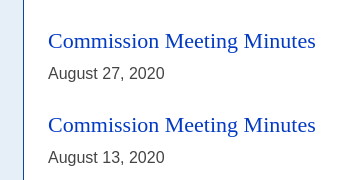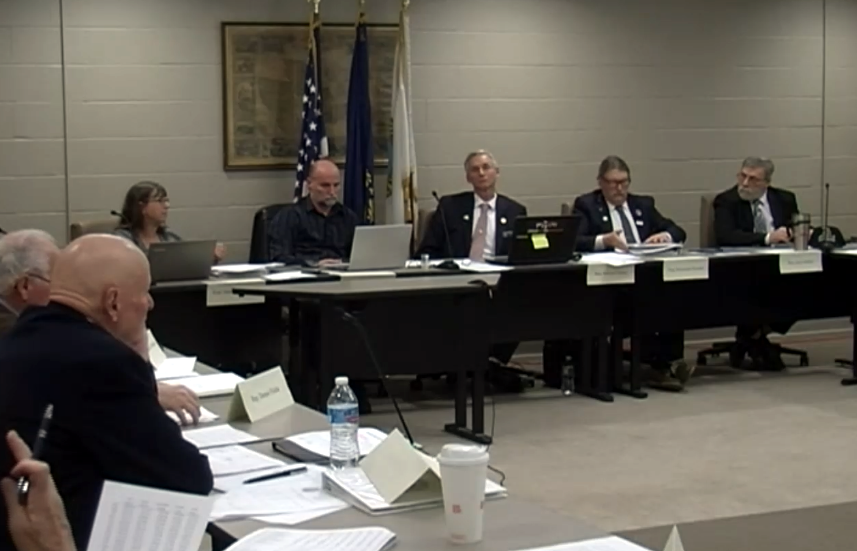Let’s start this exploration with a very short clip from the August 27, 2020 meeting of the Belknap county commissioners.
Meeting chairman DeVoy stated, “we need to ratify the vote to implement a stipend for mandatory overtime.” He then asked for a roll call vote. The total time spent on this subject in public meeting was 22 seconds.
Go ahead and have another look. Was there a motion to approve a policy? Was there any discussion? What is this vote that they claim to be ratifying?
The relevant section of the meeting agenda tells us:

and the minutes of that meeting;

The commissioners “voted” for this policy on August 17, but that vote seems to have taken over four hours. Anyone with the slightest comprehension of RSA 91-A will understand that the commissioners did not vote on August 17, they did not have a meeting. Lacking a meeting, there was no vote. If there was no vote, then there was nothing to ratify. At best this is a clear admission of a violation of our right-to-know law.
91-A:2 Meetings Open to Public. –
I. For the purpose of this chapter, a “meeting” means the convening of a quorum of the membership of a public body… whether in person, by means of telephone or electronic communication, or in any other manner such that all participating members are able to communicate with each other contemporaneously… for the purpose of discussing or acting upon a matter or matters over which the public body has supervision, control, jurisdiction, or advisory power.
I advised the commissioners of their error, in the hope that they would give more consideration to the command of our constitution in Part I, Article 8.
Government, therefore, should be open, accessible, accountable and responsive.
Not only did they ignore it, they paid their attorney to try to explain the problem away.
Attorney Fitzgerald’s first attempt to make the problem go away, his response to the county administrator:

Notice that he states, “a particular action is of no legal effect and did not constitute a binding vote.” And he goes on, “if the tentative approval became a reality through a formal vote at a properly noticed meeting.” I agree, it will become a reality if they ever do have such a vote.
It is clear that attorney Fitzgerald has not seen that 22 seconds of video above. His “understanding is that the matter was raised at the actual meeting, an explanation of the proposed action was provided by Chairman DeVoy and then a vote was taken,” is not based in reality. A good attorney practicing due diligence would not allow such a deviation from the facts.
By stating, “Given the fact,” when operating from a false premise, the result will fall short of good legal advice. We can not know from this if he has failed to acquire the proper facts from which to make his conclusion or if he is trying to be elusive of his own accord. Either case opens attorney Fitzgerald to a question of integrity.
Being less than satisfied with the attempt to brush off my concerns, I formally addressed the commissioners in a letter written on November 2, 2020.
On November 5, 2020 the county administrator wrote to the commissioners outlining her version of the timeline of events. Notably she states, “At the commission meeting 8/27/20, the Board reviewed the policy and ratified its vote of approval in public.” As we saw earlier, attorney Fitzgerald properly had stated that there was no vote on 8/17. And “the Board reviewed the policy” is a stretch referring to the Board’s action (go take another look at the video if you don’t recall all 22 seconds).
The administrator’s letter has another concerning detail, the first shift worked under the new policy happened on August 23, 2020, five days prior to the scheduled vote.

On November 10, 2020 attorney Fitzgerald wrote to the administrator explaining away concerns. He makes the claim that the policy was to be instituted retroactively to 8/14/2020. Once again, do you recall from the video, the discussion of this being implemented retroactively as attorney Fitzgerald suggests.
Next in his letter attorney Fitzgerald re-affirms that there was no illegal communication outside of a meeting; a fine bit of distraction as that was not at issue. The issue is that there was no vote on 8/17/2020 that would need to be ratified on 8/27/2020. Oddly, he mentions ‘the meeting later that evening’ referring to 8/17/2020, there was NO meeting held on that date.

Being less than satisfied with the responses to this issue I sent another letter to the commissioners on November 16, 2020.
Where will this end?
91-A:7 Violation. – Any person aggrieved by a violation of this chapter may petition the superior court for injunctive relief.
The county commissioners have a rather poor track record when it comes to abiding by injunctions.
91-A:8 Remedies. –
III. The court may invalidate an action of a public body or public agency taken at a meeting held in violation of the provisions of this chapter, if the circumstances justify such invalidation.
What judge would say that all those stipends paid in the past year are invalid payments? Can I dream of the commissioners being personally hit with the bill?

